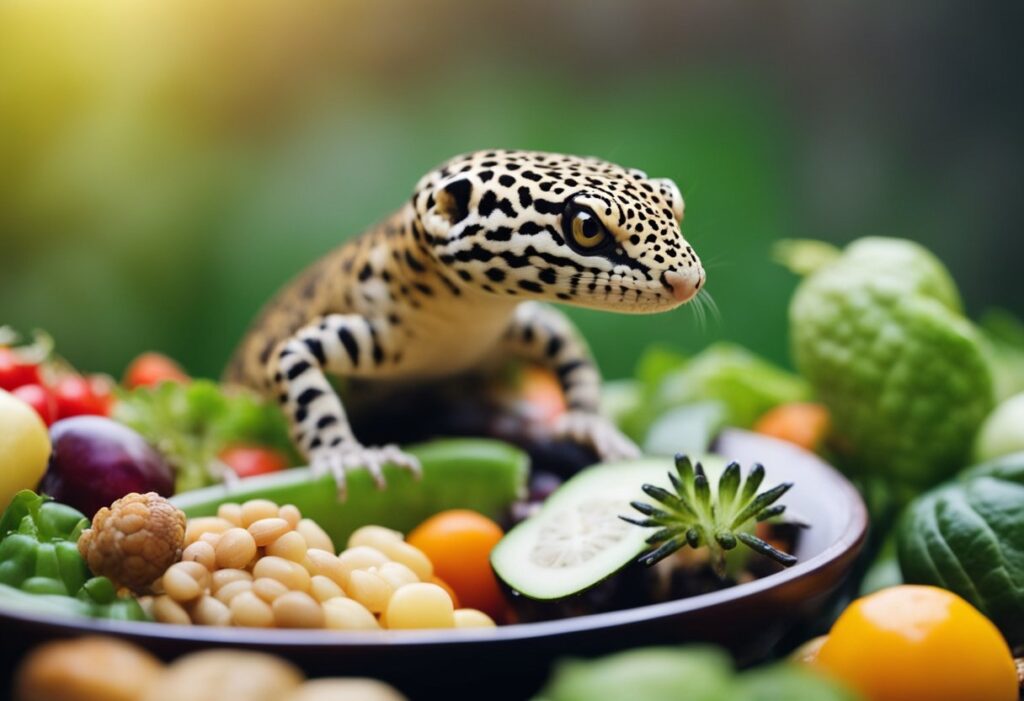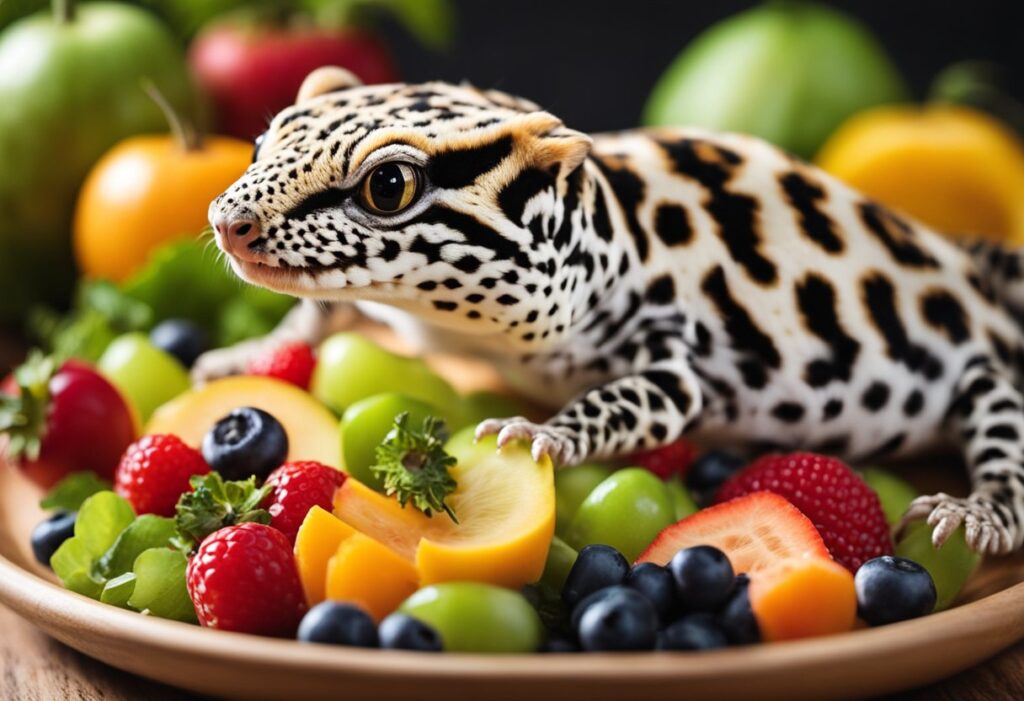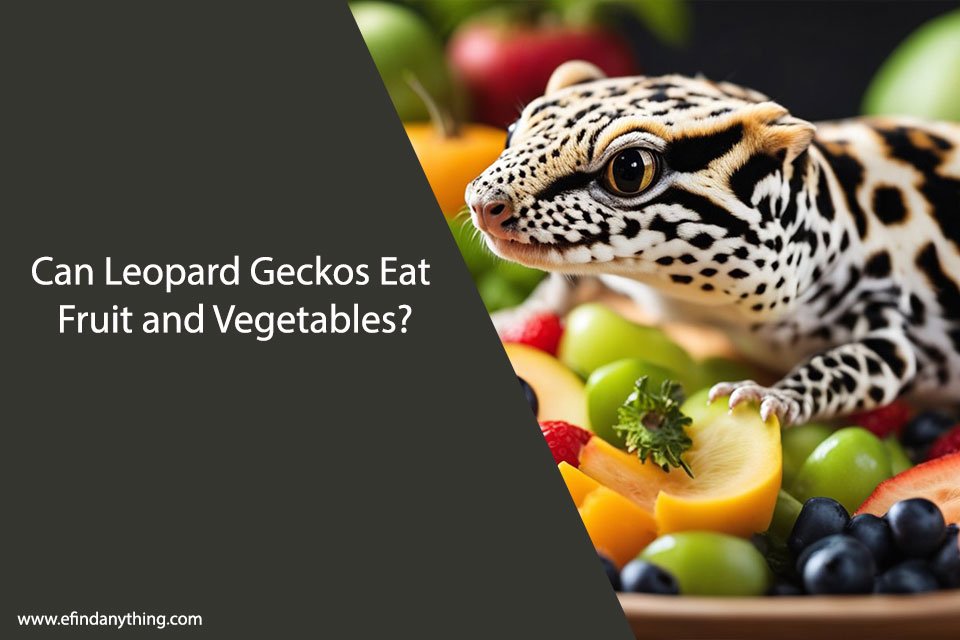Leopard geckos are a popular pet among reptile enthusiasts due to their unique appearance and low maintenance. As with any pet, it is important to provide them with a balanced and nutritious diet. While insects are the primary food source for leopard geckos, many owners wonder if they can supplement their diet with fruits and vegetables.

The short answer is no, leopard geckos should not eat fruit and vegetables. In the wild, leopard geckos are strictly insectivores and have evolved to digest and absorb nutrients from a diet consisting solely of insects. While fruits and vegetables may seem like a healthy addition to their diet, they can actually be harmful to their digestive system.
Table of Contents
Leopard Gecko Dietary Basics

Leopard geckos are insectivores, which means their primary diet consists of insects. However, some owners may wonder if it’s safe to offer their leopard geckos fruits and vegetables. In this section, we will discuss the basics of leopard gecko dietary requirements.
Nutritional Requirements
Leopard geckos require a balanced diet to maintain their health and well-being. They need a variety of nutrients, including protein, fat, vitamins, and minerals. Insects are the primary source of these nutrients for leopard geckos, as they provide a complete and balanced diet.
However, fruits and vegetables do not provide the same nutritional value as insects. While some fruits and vegetables contain vitamins and minerals, they do not provide enough protein or fat to meet a leopard gecko’s nutritional requirements. Therefore, fruits and vegetables should not be a significant part of a leopard gecko’s diet.
Common Diet Components
As mentioned earlier, insects are the primary diet component for leopard geckos. The most common insects fed to leopard geckos include crickets, mealworms, waxworms, and superworms. It’s essential to offer a variety of insects to ensure a balanced diet.
Leopard geckos should also have access to clean water at all times. Water should be changed daily and offered in a shallow dish that is easy for the gecko to access.
In conclusion, while fruits and vegetables may provide some nutritional value, they should not be a significant part of a leopard gecko’s diet. A balanced diet consisting of a variety of insects is essential to meet their nutritional requirements and maintain their health and well-being.
Can Leopard Geckos Eat Fruit?

Leopard geckos are insectivores, which means that their diet mainly consists of insects. However, they can also eat other foods such as fruits and vegetables. In this section, we will discuss whether leopard geckos can eat fruit and what types of fruit are safe for them to consume.
Potential Fruits for Leopard Geckos
Leopard geckos can eat a variety of fruits, but it is important to note that they should only be given as an occasional treat and not as a regular part of their diet. Some safe fruits for leopard geckos include:
- Apples (without seeds)
- Bananas (in small amounts)
- Blueberries
- Mangoes
- Melons (cantaloupe, honeydew, etc.)
- Papayas
- Peaches (without pits)
- Pears
- Strawberries
It is important to note that fruits should be cut into small pieces and offered sparingly to prevent overfeeding and potential health issues.
Risks of Feeding Fruit
While some fruits are safe for leopard geckos to eat, there are also risks associated with feeding them fruit. One of the main risks is that fruit is high in sugar, which can lead to obesity and other health problems if consumed in excess. Additionally, some fruits contain high levels of oxalates, which can bind to calcium and prevent its absorption, leading to metabolic bone disease.
In conclusion, leopard geckos can eat fruit as an occasional treat, but it should not be a regular part of their diet. It is important to only offer safe fruits in small amounts to prevent overfeeding and potential health issues.
Can Leopard Geckos Eat Vegetables?

Leopard geckos are primarily insectivores, which means they primarily eat insects. However, some vegetables can be a good addition to their diet. In this section, we will discuss which vegetables are suitable for leopard geckos and how to prepare and serve them.
Suitable Vegetables for Leopard Geckos
While leopard geckos can eat some vegetables, it is important to note that they should not make up the majority of their diet. Vegetables should only be given as a small supplement to their regular insect diet. Here are some vegetables that are safe for leopard geckos to eat:
- Carrots
- Squash
- Sweet potato
- Green beans
- Peas
- Bell peppers
It is important to note that vegetables should be given in moderation, as too much can cause digestive issues. Additionally, it is important to avoid feeding them vegetables that are high in oxalates, such as spinach and kale, as these can cause health problems.
Vegetable Preparation and Serving Sizes
Before feeding vegetables to your leopard gecko, it is important to properly prepare them. Vegetables should be chopped into small, bite-sized pieces and lightly steamed or boiled to make them easier to digest. Raw vegetables can be difficult for leopard geckos to digest and can cause digestive problems.
When feeding vegetables to your leopard gecko, it is important to only give them a small amount. A good rule of thumb is to give them a piece of vegetable that is no larger than the size of their head. This will help prevent overfeeding and ensure that they are getting a balanced diet.
In summary, while leopard geckos are primarily insectivores, they can eat some vegetables as a small supplement to their diet. It is important to only give them safe vegetables in moderation and to properly prepare and serve them. Remember to always consult with a veterinarian before making any significant changes to your leopard gecko’s diet.
Feeding Frequency and Portion Control
When it comes to feeding leopard geckos fruits and vegetables, it’s important to keep in mind the frequency and portion control. While it’s tempting to offer these foods as a treat, they should not make up a significant portion of their diet.
We recommend offering fruits and vegetables to leopard geckos once or twice a week, in small quantities. A good rule of thumb is to offer a piece of fruit or vegetable that is roughly the size of their head. Overfeeding can lead to digestive issues and potential health problems.
It’s also important to note that not all fruits and vegetables are safe for leopard geckos to eat. Avoid feeding them citrus fruits, as the acid can be harmful to their digestive system. Stick to safe options like leafy greens, carrots, and squash.
In addition to fruits and vegetables, leopard geckos should also have a balanced diet of insects and calcium powder. We recommend feeding them a variety of insects such as crickets, mealworms, and dubia roaches. Dusting their food with calcium powder can help ensure they are getting the necessary nutrients for a healthy diet.
Overall, while fruits and vegetables can be a healthy addition to a leopard gecko’s diet, it’s important to practice moderation and stick to safe options. By following a balanced diet and portion control, you can help ensure your leopard gecko stays healthy and happy.
Supplements and Vitamins for Leopard Geckos
As obligate carnivores, leopard geckos do not require fruits and vegetables in their diet. However, it is important to ensure that they receive all the necessary nutrients and vitamins to maintain good health.
One way to ensure this is by providing supplements and vitamins. Calcium and vitamin D3 are essential for proper bone growth and development, and should be added to the gecko’s diet. These can be provided through calcium and vitamin D3 powders that can be dusted on their food.
Another important supplement is a multivitamin powder, which provides a range of vitamins and minerals that may be lacking in the gecko’s diet. This can be added to their food once or twice a week.
It is important to note that over-supplementing can be harmful to the gecko’s health. Follow the instructions on the supplement packaging carefully and do not exceed the recommended dosage.
In addition to supplements, it is important to provide a balanced and varied diet of live insects such as crickets, mealworms, and dubia roaches. This will ensure that the gecko receives a range of nutrients and vitamins from different insect sources.
Overall, supplements and vitamins can be a useful addition to a leopard gecko’s diet, but should be used in moderation and in combination with a balanced and varied diet of live insects.
Foods to Avoid in a Leopard Gecko’s Diet
When it comes to feeding leopard geckos, it’s important to remember that they are primarily insectivores and have a very specific dietary requirement. While it may be tempting to offer them fruits and vegetables, it’s important to know that these foods are not a natural part of their diet and can actually be harmful to their health.
Here are some foods that we recommend avoiding in a leopard gecko’s diet:
Fruits
While some fruits may be safe for leopard geckos to eat in small amounts, it’s generally best to avoid them altogether. Fruits are high in sugar and can cause digestive issues in leopard geckos. Additionally, the high acid content in some fruits can be harmful to their digestive system.
Vegetables
Like fruits, vegetables are not a natural part of a leopard gecko’s diet and can be difficult for them to digest. Some vegetables, such as spinach and kale, contain high levels of oxalates which can bind to calcium and prevent its absorption. This can lead to metabolic bone disease, a serious health condition in leopard geckos.
Insects with Hard Shells
Leopard geckos have small, delicate digestive systems and may struggle to digest insects with hard shells, such as mealworms and superworms. These insects can also cause impaction, a condition where the digestive system becomes blocked, leading to serious health issues.
Toxic Plants
It’s important to ensure that any plants in a leopard gecko’s enclosure are non-toxic. Some common household plants, such as ivy and lilies, can be toxic to leopard geckos and can cause serious health issues if ingested.
Overall, it’s important to stick to a diet of live insects and avoid offering fruits, vegetables, and other potentially harmful foods. By providing a balanced and appropriate diet, you can help ensure that your leopard gecko stays healthy and happy.
Monitoring Your Leopard Gecko’s Health
As responsible pet owners, it is important for us to monitor the health of our leopard geckos regularly. While leopard geckos are generally healthy and hardy pets, it is still important to keep an eye out for any signs of illness or disease.
One of the easiest ways to monitor your leopard gecko’s health is by observing their behavior and appetite. A healthy leopard gecko will be active and alert, with bright eyes and a smooth, shiny coat. They should also have a healthy appetite and be eager to eat their regular diet of insects.
In addition to observing your leopard gecko’s behavior, it is also important to keep track of their weight. A sudden loss of weight could be a sign of illness or parasites, while rapid weight gain could indicate overfeeding or an underlying health issue.
Regular veterinary check-ups are also important for maintaining your leopard gecko’s health. A reptile veterinarian can perform a thorough physical exam and check for any signs of illness or disease. They can also provide advice on proper nutrition and care for your leopard gecko.
Overall, by monitoring your leopard gecko’s behavior, appetite, weight, and seeking regular veterinary care, you can help ensure that your pet stays healthy and happy for years to come.
Frequently Asked Questions
What alternative foods are safe for leopard geckos?
Leopard geckos are primarily insectivores and require a diet that is high in protein. Some alternative foods that are safe for leopard geckos to consume include mealworms, crickets, and waxworms. It is important to ensure that any insects fed to leopard geckos are gut-loaded, meaning they have been fed a nutritious diet themselves before being fed to the gecko.
Are there any fruits suitable for leopard geckos to consume?
While leopard geckos are not known to eat fruit in the wild, some fruits can be safe for them to consume in small amounts. Fruits that are high in sugar, such as bananas and mangoes, should be avoided. However, small amounts of fruits like apples and berries can be offered as a treat.
Is it safe for leopard geckos to eat vegetables, and if so, which ones?
Leopard geckos are not able to digest plant matter as efficiently as they can digest animal protein. While some vegetables, such as carrots and squash, can be offered in small amounts, they should not make up a significant portion of the gecko’s diet.
What are the dietary restrictions for leopard geckos concerning plant-based foods?
Leopard geckos should not be fed a diet that consists primarily of plant-based foods. Their digestive systems are not designed to handle large amounts of plant matter, and a diet that is too high in vegetables can lead to digestive issues.
Can leopard geckos safely ingest any human foods?
Leopard geckos should not be fed human foods, as many of these foods are not nutritionally appropriate for them. Additionally, some human foods can be toxic to leopard geckos.
Are there any risks associated with feeding leopard geckos fruits or vegetables?
Feeding leopard geckos fruits or vegetables in moderation is generally safe. However, it is important to ensure that any fruits or vegetables offered to the gecko are chopped into small, bite-sized pieces to prevent choking. Additionally, fruits that are high in sugar should be avoided, as they can lead to obesity and other health issues.





